| |||||||||||||||||||||||||||||||||
| Facts > Getting Started > Sources | |||
| |
Sources |
| How do we know what we know? |
|
No direct and first-hand information
about Jesus survives.
|
|
The keys of hell and the guarantee of salvation were in the hands of the goddess, and the initiation ceremony itself a kind of voluntary death and salvation through divine grace Apuleius, Metamorphosis.
Ch 11 Christianity began in the middle of ancient Mediterranean culture. For the ancients things didn't happen in accordance with laws of nature, things happened because they were caused by invisible, intelligent personalities. That maybe sounds like a no big deal difference between them and us, but the ideas that logically flow from the ancient's magic-beings understanding of cause and effect include stuff that looks familiar to fans of our bible—miracles, prophesies, demons, virgin births, angels, magic dreams, even God and heaven. As we go through POCM, I'll show you not just that Christianity and Paganism share ideas, I'll show you how their shared ideas—miracles, prophesies, demons, virgin births, angels, magic dreams, God, heaven—all fit the ancients' primitive god-being centered understanding of how the world worked. Our Christianity doesn't come from Jesus and a big bang, it comes from the accumulation of legends and theologies by ancient people who believed in Jesus. The origin of those legends and theologies wasn't Jesus. The origin was the myths, legends, philosophies, prejudices, literature, superstitions, and primitive cosmology of ancient western culture. Christianity is a product of its time and place. |
Sources The question defines the evidence. The evidence refines the question. When you do review the available record, you'll see that so many basic facts have been lost it is not possible to know each step with which Christianity began. I mean, not possible to say exactly who did what, where, when. Not possible to say, "Jesus was boosted line for line from Mithras" (a guess), or, "The sacrament of the eucharist was founded by Jesus the sacrament at the last supper" (a legend). Exactly what happened we can't know. |
|
Direct Evidence of Christian Origins
There is none. I mean, there is no record written by people who were there
at the beginning of our religion. Jesus left no written record. The people
No direct and first-hand information about Jesus survives. Information from outside Christian sources is unavailable. One must therefore rely exclusively on Christian sources. The semi biographical framework of the gospel stories, however, is the result of the editorial work of the gospel writers and can therefore not be used for the reconstruction of the ministry of Jesus. Harvard
Professor Helmut Koester. History
and Literature of Early Christianity, Volume
2, Introduction to the New Testament, 2d
edition. (2000), pg. 78]
Yes I do know this isn't what they told you at vacation bible school. It is however the unavoidable conclusion of modern New Testament scholarship, as even arch apologists like Reverend Bruce Manning Metzger agree. A number of good books explain the analysis. So the truth is, we do not have direct evidence of exactly how Christianity began. How about that. |
| For Christianity the sources are:
|
For Paganism things are much tougher. Pagan religious books were banned and burned. Except for a few quoted fragments and the Pyramid Texts, no Pagan sacred texts survive. What we know about Pagan religion comes largely from stone inscriptions and incidental descriptions in other ancient literature—histories, dramas, essays. |

|
Some ancient religion was unwritten—we think. Some was written, but certainly the ancients' religious secrets were not written about outside their sacred books, and those books were banned and burned. There's a lot about Pagan religion we just don't know. |
Why
that matters
The bottom line is too few details survive to let us make one-for-one connections between how Pagan rites and sacraments fit with Pagan theology and how Christian rites and sacraments fit with Christian theology. Since we are clever little girls and boys this doesn't surprise us. We know this is exactly how it usually works. For example, too few details survive for us to make one-to-one connections between they mysteries of Demeter and the mysteries of Isis and the mysteries of Attis, and the mysteries of Samothrace, etc. etc. Yet reasonable people do not believe each of those ancient religions of salvation developed independently.
Another example. The famous historian of ancient religion (and the mysteries) Professor Walter Burkett wrote a nice book about all the stuff ancient Greek religion borrowed from Mesopotamian religion—all without enough details available to make one-to-one connections between how Greek rites and sacraments fit with Greek theology and how Mesopotamian rites and sacraments fit with Mesopotamian theology.
|
Here's a synopsis
of the surviving evidence. Pagan Sacred Writing |
| Pyramid Texts. When Egyptians buried rich guys in pyramids, they wrote prayers and spells on the walls and in the coffin. These survive. They're called "Pyramid Texts" and "Coffin Texts." Records about they Egyptian Savior God Osiris go way back—into the 3,000s BC >>
|
Osiris has a thick
textual dossier stretching over millennia.
Although the full, connected myth is only to be found in Greek, in Plutarch's
|
|
A few fragments of Pagan ritual do survive, mostly quotations of oracles, and religious stone inscriptions on graves, temples, etc. |
Descriptions of Pagan Religion do survive.
|
||||||||||||||||
Judaism The Dead Sea Scrolls include a number of non-orthodox Jewish writing probably dating from the third - first centuries BC. Josephus, a first century Jewish quisling, wrote an important Jewish history that survives. Lots of other ancient Jewish writing, orthodox and non-orthodox, survives.
We're getting a bit far from POCM's main topic here, so for details
let me point you to the good books section below. |
Good Books for this section
Introduction
to the New Testament
|
This book is a treasure—an excellent place for new students to start and a valuable reference if you already know plenty. A clearly written, readable roundup of modern New Testament scholarship by a giant in the field. Includes the history of who wrote what, when—and who copied from whom. Not just the canonical books, but also Q, the Gospels of Thomas, Hebrews, etc. etc. Wow. Also details the history of which sects developed in each region, when. Not what you learned in Sunday school. Highly recommended for any serious student.
|
Introduction
to the New Testament
|
What you'll find:
Quite readable, but harder than Ferguson's Backgrounds of Christianity. An excellent introduction. Highly recommended for any serious student.
|
The
Golden Ass
|
The ancients had novels (who knew?!), and this is one of them. And, believe it or not, it's a fun read, lighthearted, funny, and well written. The story moves. For the boys: it even has explicit sex. Amazing. Who knew?! The story is about Lucius' adventures after he gets turned into a donkey. The first ten chapters are just fun, not related to the Pagan origins. Chapter eleven is about Lucius in Egypt, and his study and initiation into the mysteries of Isis and Osiris (he's a man again by this point). For the ancients these mysteries were sacred secrets—believers would and did die rather than reveal them. Apuleius' novel is the only surviving text that comes close to describing the mystery initiation ceremony. Apuleius also says initiation brought salvation: "The keys of hell and the guarantee of salvation were in the hands of the goddess, and the initiation ceremony itself a kind of voluntary death and salvation through divine grace."
|
|
The Complete Dead Sea Scrolls in English
|
What you'll find:
|
| The Meaning
of the Dead Sea Scrolls
|
What you'll find:
|
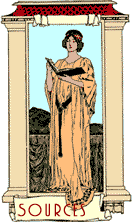

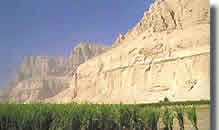
 Not
all of these survive. You'll find an outstanding roundup of canonical
and early non-canonical Christian writing in: Introduction
to the New Testament, Volume 2, History and Literature of Early
Christianity, by Harvard Professor Helmut Koester
Not
all of these survive. You'll find an outstanding roundup of canonical
and early non-canonical Christian writing in: Introduction
to the New Testament, Volume 2, History and Literature of Early
Christianity, by Harvard Professor Helmut Koester 
 Porphyry's
Against the Christians The Literary Remains by R. Joseph Hoffmann,
translator & editor. (Another reconstruction, from various
fragments.)
Porphyry's
Against the Christians The Literary Remains by R. Joseph Hoffmann,
translator & editor. (Another reconstruction, from various
fragments.) n
this lake it is that the Egyptians represent by night his sufferings
whose
n
this lake it is that the Egyptians represent by night his sufferings
whose We
do have a parts list and a blueprint for Christianity,
but our list and blueprint were written—often generations after
the "facts"—by people who weren't there at the founding.
We have no first-person record of how Christianity began. And
we know the orthodox legend doesn't tell the whole story. (For
example in the non-othodox Gospel of Thomas , Jesus brings
salvation in the form of saving wisdom; His saving death isn't part
of Thomas' version of the story.)
We
do have a parts list and a blueprint for Christianity,
but our list and blueprint were written—often generations after
the "facts"—by people who weren't there at the founding.
We have no first-person record of how Christianity began. And
we know the orthodox legend doesn't tell the whole story. (For
example in the non-othodox Gospel of Thomas , Jesus brings
salvation in the form of saving wisdom; His saving death isn't part
of Thomas' version of the story.) The
Orientalizing Revolution:
The
Orientalizing Revolution:  Through
all that time, the Osiris myth stayed pretty much the same
>>
Through
all that time, the Osiris myth stayed pretty much the same
>>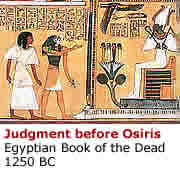 Isis
and Osiris from the early second century CE, the Osirian
Isis
and Osiris from the early second century CE, the Osirian 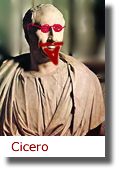
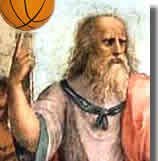

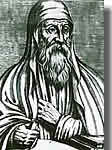


 And
the good thing is, you don't have to believe me, you can read
it for yourself.
And
the good thing is, you don't have to believe me, you can read
it for yourself. 
